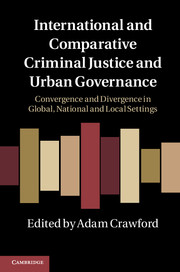 International and Comparative Criminal Justice and Urban Governance
International and Comparative Criminal Justice and Urban Governance from PART 2 - Comparative penal policies
Published online by Cambridge University Press: 05 June 2011
Introduction
Within the sociology of punishment, a veritable industry has built up both charting and theorising changes in the nature and function of crime control and penal practice in the context of late modernity (Garland 2001; Feeley and Simon 1992; O'Malley 1992). In this chapter, I will suggest that this field of scholarship has become dominated by a methodological dualism between accounts which lay emphasis on structural factors and those which lay emphasis on cultural factors. I will argue that this dualism constrains our capacity to understand the variations in crime control and penal policy which are evident across many Western jurisdictions, principally because it fails adequately to capture the multi-level nature of contemporary modes of governance both above, but, more particularly, below the nation state. A key aim of the chapter is to set out an alternative methodological strategy with which to interrogate recent developments; a strategy which draws on the vocabulary of systems theory. The chapter is built around a case study comparing Scotland and Spain with England and it comprises four interrelated parts. Part 1 overviews key variations in crime control and penal policy within my selected jurisdictions as they have evolved over the past forty years. Part 2 describes the methodological dualism within the sociology of punishment and highlights its limitations in terms of this case study. Part 3 sets out an alternative methodological strategy. Finally, Part 4 implements this strategy, offering a rereading of the case study within its own terms.
To save this book to your Kindle, first ensure [email protected] is added to your Approved Personal Document E-mail List under your Personal Document Settings on the Manage Your Content and Devices page of your Amazon account. Then enter the ‘name’ part of your Kindle email address below. Find out more about saving to your Kindle.
Note you can select to save to either the @free.kindle.com or @kindle.com variations. ‘@free.kindle.com’ emails are free but can only be saved to your device when it is connected to wi-fi. ‘@kindle.com’ emails can be delivered even when you are not connected to wi-fi, but note that service fees apply.
Find out more about the Kindle Personal Document Service.
To save content items to your account, please confirm that you agree to abide by our usage policies. If this is the first time you use this feature, you will be asked to authorise Cambridge Core to connect with your account. Find out more about saving content to Dropbox.
To save content items to your account, please confirm that you agree to abide by our usage policies. If this is the first time you use this feature, you will be asked to authorise Cambridge Core to connect with your account. Find out more about saving content to Google Drive.